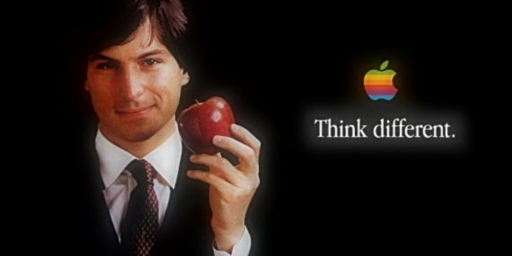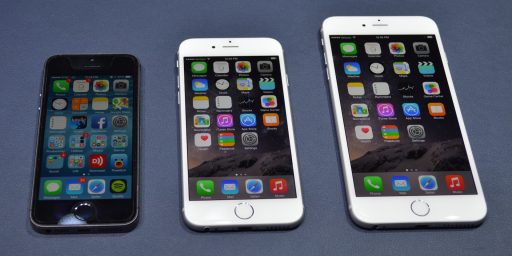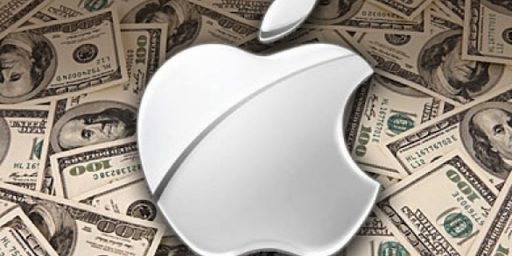The Apple Store is Cool, but is not a Model for Social Policy
A complexity of social policy is the need for universality. This is why pure market models are incompatible with government action.
 Writing at The Corner, Kevin D. Williamson takes the opportunity of Steve Jobs’ death to critique Occupy Wall Street (and to grind some ideological axes in the process). For example, it seems to me that the day after Jobs’ death was not the time to critique a CNN piece from 2008 about philanthropy to go into an extended challenging of Gordon Gekko, (although I do agree with the notion that successful businesses can contribute to the general good). One can read the whole thing, as the saying go, if one wishes to see those issues.
Writing at The Corner, Kevin D. Williamson takes the opportunity of Steve Jobs’ death to critique Occupy Wall Street (and to grind some ideological axes in the process). For example, it seems to me that the day after Jobs’ death was not the time to critique a CNN piece from 2008 about philanthropy to go into an extended challenging of Gordon Gekko, (although I do agree with the notion that successful businesses can contribute to the general good). One can read the whole thing, as the saying go, if one wishes to see those issues.
The main thing that struck me, and sparked this post, was his parting shot at OWS:
Look at the phone in your hand. Look at the rat-infested subway. Visit the Apple Store on Fifth Avenue, then visit a housing project in the South Bronx. Which world do you want to live in?
The piece also takes a swipe at public education.
Now, is there room to criticize public education? Oh, to borrow a catchphrase of a prominent politician, you betcha. Likewise, can subways be unpleasant places? Yes. Are Apple Stores really cool? No doubt about it at all.
However, comparing subways and housing projects to Apple Stores in some attempt to contrast the public and private sectors is more than a tad problematic. Indeed, it strikes me as a common error made in such conversations. To wit: the comparison here is between a service that has to be offered universally (or nearly so) to the public at a reasonable cost versus a luxury product that only goes to those who can afford it. Further, the former is provided by a government constrained by things like elections and a multiplicity of other demands on the public coffers.
These things are not at all comparable.
Forget for a moment the profound differences between public and private entities and just consider the problem of universality. Universality (or even broad access) is expensive and requires the casting a of a large net. Further, the more accessible things are made to a broader population, the less appealing they tend to be.
Consider: air travel is provided on a very large scale by private companies (albeit in a highly regulated industry) and it isn’t exactly like a trip to the Apple Store. Of course, if one can afford to fly first class it is a lot more pleasant. It isn’t a universal service the way public transportation is, but it requires broad access and therefore can be rather unpleasant in ways that I suspect having a private charter plane isn’t.
Or, moving away from an industry that is highly regulated to one that isn’t: shopping at a Wal*Mart is not as pleasant as shopping at a higher end supermarket. If one is willing (and able) to pay more, the shopping experience can be improved upon. Wal*Mart, however, is a lot more accessible (because of price) to the general public than is a more expensive, higher end grocery store.
The point is: the closer one gets to inexpensive and widely consumed, the less like Apple Store life gets, even in the private sector. Other examples that come to mind: large, bureaucratic entities like cable and cell phone companies.
However, size isn’t even the main issue, the main issue is universal access. A private company’s job is not to provide universal access its product. UPS can decide not to take packages to certain places (or charge more to go some places than others) while the USPS has to provide universal access, even if Grandma lives down a dirt road in the middle of Nowhere, USA. A private school can reject a child because of behavior or academic performance, but the public school cannot (indeed, they are required by law to make any number of accommodations to help students who have special needs of any number of types). The pattern is pretty clear and is utterly ignored by Williamson’s post.
I admire and respect the market. I absolutely adore my iPhone and iPad and I do not, for a moment, think that government is equipped to produce such products and innovations (not that government actions are irrelevant to innovations—just consider how these words are reaching those who are reading them for evidence). Having said that, if we are going to debate the relative merit of the marketplace and the government when it comes to debating what each can and cannot contribute to society we have to be a lot better at understanding what we are debating. Comparing the Apple Store to the NYC subway system in terms of a customer service experience is nonsense. False dichotomies of this type are not helpful, and yet they are typical in our political discourse.
Fundamentally we have to accept and confront the difficulties and challenges that exist when we are dealing with universal access to services. This factor really matters when making comparisons. Further, one has to at least acknowledge what should be an obvious point: if one has money to spend, one is likely to have a better general experience. Indeed, the unspoken (and often intellectually ignored) aspect of many conservative critiques of government is that what they are really saying is that access should be for those who can afford it. This is fair for iPhones, but not for public transportation and education. It is a fantasy to pretend like simply appealing to the market fixes these problems if universal or near universal access is a goal.
And yes: I would rather live in a world that looked like Apple Stores as opposed to housing projects. But that’s not really the choice, is it?





Not necessarily true.
I’d much rather be eating a Big Mac (and checking my Monopoly pieces) at my local McDonald’s than be eating raw squid parts at the fancy upscale sushi place next door.
@ponce: I dunno. I have a hard time thinking of my McDonald’s experiences as being like the Apple Store 😉
I agree that it was inappropriate for Williamson to take a swipe at pubic education in a public forum.
@Megan McArdle:
That’s a very cheap shot, Megan. Plus, you beat me to it.
Speaking of Social Policy……..and cheap shots.
Has anyone asked how much our carbon footprint and battery waste has increased with all those ipods, ipads, computers, servers…………..all for inane text messages and “apps” just so you can look up the temperature in Utah or check out how Manchester United is doing?
I mean, really, Greenland is metling and we are about to have drowned polar bears littering midtown Manhattan. Or maybe not……..
http://online.wsj.com/article/SB10001424052970203388804576612620828387968.html?mod=rss_opinion_main
My local Apple store is like a cattle pen.
My local McDonald’s is a sparkling temple of yummy consumerism.
YMMV.
I like shopping at WalMart better than an upscale grocery store. At least WalMart has fresh popcorn that doesn’t cost an arm and leg. Grocery stores won’t even offer that, at least any I’ve been in.
Totally agree with this post (and I continue to find it strange how the right attempts to claim Jobs/Apple as a conservative model).
@Drew as usual you cite a source that gets most of his key evidence wrong. Do you ever notice how climate skeptics materials are always published in the opinion section of newspapers — i.e. the location where the content is explicitly *not* fact checked.
Bryce’s completely mischaracterizes the work of Tom Wigely. If you look at what Wigely wrote, you find that (a) he and his research continues to support the theory of anthropomorphic climate change (something Bryce conveniently fails to mention) and (B) that the issues is NOT about the release of CO2 (which Wigely notes still leads to warming) but rather other chemicals that are released from the coal in combination with the project leak of unprocessed methane. (C) He notes that stopping burning coal would eventually lead to a drop in temperature. Additional he (D) is not a particular supporter of coal technology because of other environmental impacts…
Wigely summarized by his own organization:
http://www.powerlineblog.com/archives/2011/10/the-new-hockey-stick.php
Bummer.
@Drew: Drew, you’re brain-dead. Matt just took you to task for getting your info from a newspaper rather than directly from an actual climatologist. Your response is a link from a political blog.
I know IQ isn’t a factor in your role at Taco Bell, but you could at least put in a little effort. Who knows, you might end up the general manager one day.
Of course it becomes problematic, especially when you employ subjective terms to frame your argument (and I note, just as Williamson did).
When I entered High School, my father (Army) had just been re-posted back in the States. Living on the German economy for the past three years, I incorrectly presumed that all the kids with the muscle cars at my new school had to be rich. Little did I know that they had made choices to be able to buy, build and maintain those cars. Years later, when in college, I made the choice to not purchase a vehicle, or get cable TV, so that I could buy higher priority items. Today, many people make the choice to purchase smart phones at the expense of other items; the other items are in fact, the real luxury items.
“I know IQ isn’t a factor in your role at Taco Bell, but you could at least put in a little effort. Who knows, you might end up the general manager one day.”
And I know you mean that in only the best way. Just a point of order. Do you guys tend to go to the 7AM AGW services, or have breakfast first and go to 11AM mass?
Oh, did you read the article?
Powerline is still around?
Who knew?
What’s funny is how the fringe right toadies keep pushing the oil and coal companies’ lies long after the oil and coal companies themselves have admitted Global Climate Change is real and started investing the money they were spending on phony science and propaganda into green technology research.
The right isn’t claiming Jobs/Apple as a conservative model, we are claiming Jobs/Apple as an American model – a model of American exceptionalism. One that when unencumbered by a federal government so desirous of choosing winners and losers, allows entrepreneurs to develop and invest in radically new and innovative technologies that change the world.
@bains: Just because people have different priorities doesn’t make them non-luxury items. My preference for a smart phone over a new TV doesn’t make it an essential. And regardless of how I prioritize, I still have to be able to afford the items I wish to purchase.
As such, I am not sure what your point is (expect perhaps to point out that one needn’t* be rich to have a particular item–but, of course, I never claimed that).
*edited (typed the wrong suffix).
@bains:
You’ll forgive us for refusing to accept Steve Jobs as an example of why Mammon worship makes the United States exceptional. Just out of curiosity, how is it that Jobs avoided the government interference you claim is destroying innovation?
Steven:
My point is that you use the same ‘flowery’ language to frame your argument in your favor that you object to when employed by Williamson.
No, you did not claim that, but you certainly suggested that by your use of “those that can afford… luxury items. You are elevating normal conveniences to the status of “luxury” item to bolster your argument – and this process is indistinguishable from that which you are speaking against.
In a (few) word(s), you are doing just what you are railing against Williamson for doing…
@Ben Wolf:
If you care to scroll upwards, you will find that I did not say destroying, I said encumbering. And Jobs avoided that encumbrance because, as a model of American ingenuity, he created fields where the Federal Government had no clue of potential taxation and regulation.
@bains: So to avoid the government, all one has to do is innovate. Gee, who knew? Oh, wait: federal R&D provided the basic research Jobs leveraged into a profit machine. But we’ll just pretend that never happened, as it conflicts with our “government is the problem” obsession.
@bains: Perhaps I am being unclear (although I don’t think that I am). I am not in that section of the post that there is a rather fundamental difference between a consumer product and publicly provided, near-universal services.
If it makes you feel any better, feel free to read the above sans the adjective “luxury” if you really feel it utterly changes the meaning.
Still, I am at a loss as to how this creates confusion in my argument: stuff bought at an Apple Store (iPod, iPhone, iPad, etc) are categorically different that public transportation, whether one calls them a “luxury item” or not.
@michael reynolds: @Megan McArdle: Well, I certainly am not saying he ought not criticize public education (which I would have thought my next sentence would have made clear–all I was trying to do was catalog the various public services that exit (for good or for ill) that he criticizes in comparison to Apple Stores. I did think his reference to public education was flippant as was mine.
@bains:
I just don’t get this at all — in that there have been other great innovators who have not been American… Was Tesla an example of Austrian Exceptionalism? What about Einstein — German? Or perhaps Jewish?
This account also fails to note how much of the technological infrastructure that Jobs and company built their innovations on were the result of Government funded research (I suggest “For Counter Culture to Cyber Culture” by Turner, “Where the Wizards Stay Up Late” By Haeffner, or Markoff’s “What the Doormouse Said” for excellent accounts of the development of the American Tech “Industry” and it’s long ties to Government funding).
But of course, like any good legend (which American Exceptionalism is) you won’t let the facts get in front of the story that justifies your point of view.
@Steven L. Taylor:
Dude: pubic. We were copyediting.
@michael reynolds: Ah, yes, that would be worth fixing now wouldn’t it.
Thanks for pointing out my density.
@Steven L. Taylor:
Hey, you know how much I’m tormented by editors?
@michael reynolds: Indeed. Although clearly I need an editor.
@michael reynolds:
When Beverly Sills’s biography was published, on the first page was printed, “I first sang in pubic when I was 12.” She thought it was hilarious.
@Racehorse: An you might even get a free picture taken at WalMart.
The Apple Store??
For those who think that Apple just sprang out of the ground without any government support or involvement at all, think also about all those bloody patents and trademarks that Apple owns.
The reason that the government is more “inefficient” than the private sector is that it has to deal with the dregs and other non-economic bits. I’m sure the US Postal Service could be much more efficient if it could stop delivering to everyone who lives out in the middle of nowhere (or at least could charge actual cost rather than 44 cents.) And if we could just dump all the people who don’t have jobs or disabled are on welfare or in prison in a state like Kansas, give them some axes and shovels and tell them to take care of themselves, too bad if you don’t make it, yeah, that would save a lot of money as well.
Face it: a society is always going to have to deal with people who can’t otherwise support themselves. A business can blithely ignore all people who can’t afford to purchase their goods. Big difference.
@ponce:
Even if we limit ourselves to fast food burger places, McDonald’s makes about the worst product out there. The fact you prefer it over its competitors, tells me you have absolutely no sense of taste.